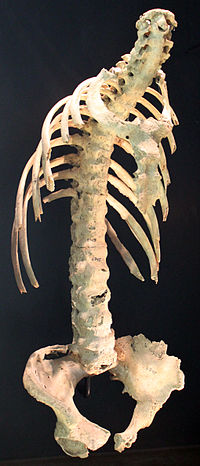
Photo from wikipedia
Klebsiella pneumoniae is an opportunistic pathogen, and its hypervirulent variants cause serious invasive community-acquired infections. A genomic view of K. pneumoniae NTUH-2044 for the carbohydrate phosphotransferase system (PTS) found a… Click to show full abstract
Klebsiella pneumoniae is an opportunistic pathogen, and its hypervirulent variants cause serious invasive community-acquired infections. A genomic view of K. pneumoniae NTUH-2044 for the carbohydrate phosphotransferase system (PTS) found a putative fructose PTS, namely, the Frw PTS gene cluster. ABSTRACT Klebsiella pneumoniae is an opportunistic pathogen, and its hypervirulent variants cause serious invasive community-acquired infections. A genomic view of K. pneumoniae NTUH-2044 for the carbohydrate phosphotransferase system (PTS) found a putative fructose PTS, namely, the Frw PTS gene cluster. The deletion mutant and the complemented mutant of frwC (KP1_1992), which encodes the putative fructose-specific enzyme IIC, were constructed, and the phenotypes were characterized. This transmembrane PTS protein is responsible for fructose utilization. frwC deletion can enhance biofilm formation and capsular polysaccharide (CPS) biosynthesis but decreases the growth rate and lethality in mice. frwC expression was repressed in the cyclic AMP receptor protein (CRP) mutant. Electrophoretic mobility shift assay showed that CRP can directly bind to the promoter of frwC. These results indicated that frwC expression is controlled by CRP directly and that such regulation contributes to bacterial growth, CPS synthesis, and the virulence of the Δcrp strain. The findings help elucidate fructose metabolism and the CRP regulatory mechanism in K. pneumoniae.
Journal Title: Infection and Immunity
Year Published: 2018
Link to full text (if available)
Share on Social Media: Sign Up to like & get
recommendations!